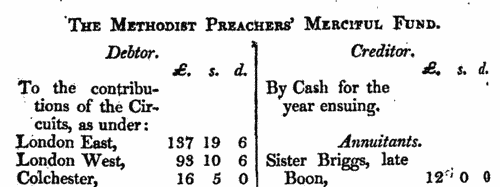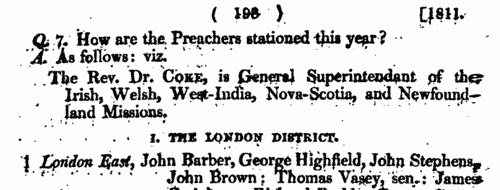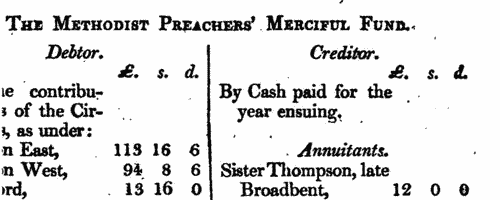Our indexes include entries for the spelling collier. In the period you have requested, we have the following 1,472 records (displaying 651 to 660):
Wesleyan Methodist preachers
(1810)
A comprehensive list of Wesleyan Methodist ministers arranged by station and circuit in Britain, Ireland and abroad, was prepared each year at the church's annual conference. This includes supernumeraries and missionary preachers. | Sample scan, click to enlarge

|
Wesleyan Methodist preachers afflicted with illness
(1810-1811)
The Wesleyan Methodist church allowed payments for relief of the afflicted among their clergy, and these payments are listed in the annual accounts. | Sample scan, click to enlarge

|
Wesleyan Methodist preachers' widows
(1810-1811)
The Wesleyan Methodist church's Merciful Fund provided annuities for preachers' widows, as well as other payments to retired clergy, widows and other dependants in need. These are listed in the annual minutes. Particularly useful is the fact that, after a widow remarried, her first married surname and her new surname were both given. | Sample scan, click to enlarge

|
Wesleyan Methodist preachers' wives
(1810-1811)
Wives of Wesleyan Methodist ministers were supported by the church, either centrally or through the local congregations: lists of wives were therefore printed in the annual minutes. Unfortunately, the ladies' Christian names are never given; where it is necessary to distinguish between wives of ministers with the same surnames, the husbands' Christian names are given. The S. preceding each name signifies 'Sister'. Examining these lists is nevertheless a good way to trace approximate dates of marriage for a minister, and approximate dates of death of wives that predeceased them.
| Sample scan, click to enlarge

|
Deaths, Marriages, News and Promotions
(1811)
Death notices and obituaries, marriage and birth notices, civil and military promotions, clerical preferments and domestic occurrences, as reported in the Gentleman's Magazine. Mostly from England and Wales, but items from Ireland, Scotland and abroad.
| Sample scan, click to enlarge

|
Wesleyan Methodist preachers
(1811)
A comprehensive list of Wesleyan Methodist ministers arranged by station and circuit in Britain, Ireland and abroad, was prepared each year at the church's annual conference. This includes supernumeraries and missionary preachers. | Sample scan, click to enlarge

|
Wesleyan Methodist preachers afflicted with illness
(1811-1812)
The Wesleyan Methodist church allowed payments for relief of the afflicted among their clergy, and these payments are listed in the annual accounts. | Sample scan, click to enlarge

|
Wesleyan Methodist preachers' widows
(1811-1812)
The Wesleyan Methodist church's Merciful Fund provided annuities for preachers' widows, as well as other payments to retired clergy, widows and other dependants in need. These are listed in the annual minutes. Particularly useful is the fact that, after a widow remarried, her first married surname and her new surname were both given. | Sample scan, click to enlarge

|
Berkshire Freeholders: Abingdon
(1812)
The poll of the freeholders of Berkshire on an election of two representatives in Parliament, taken at Abingdon on Monday 12 October 1812 and fourteen following days. The candidates were Charles Dundas esquire (D: 1717 votes), the Hon. Richard Neville (N: 1374), and William Hallett esquire (H: 525). This poll book sets out the names of the voters in alphabetical order parish by parish. After the name of the parish or township, the name of the hundred in which it lay is given in italics. The freeholders' full names are stated, surname first, and the place of their abode (often elsewhere). The right hand column records their votes. The qualification for suffrage in the counties was the possession of a freehold estate worth more than 40s a year. | Sample scan, click to enlarge

|
Berkshire Freeholders: Barkham
(1812)
The poll of the freeholders of Berkshire on an election of two representatives in Parliament, taken at Abingdon on Monday 12 October 1812 and fourteen following days. The candidates were Charles Dundas esquire (D: 1717 votes), the Hon. Richard Neville (N: 1374), and William Hallett esquire (H: 525). This poll book sets out the names of the voters in alphabetical order parish by parish. After the name of the parish or township, the name of the hundred in which it lay is given in italics. The freeholders' full names are stated, surname first, and the place of their abode (often elsewhere). The right hand column records their votes. The qualification for suffrage in the counties was the possession of a freehold estate worth more than 40s a year. | Sample scan, click to enlarge

|
Research your ancestry, family history, genealogy and one-name study by direct access to original records and archives indexed by surname.











